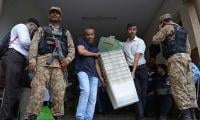ISLAMABAD: Foreign Minister Shah Mehmood Qureshi Thursday said in the Senate a stable and peaceful neighborhood is Pakistan’s requirement in order to improve its socio-economic conditions, being a need of India as well.
The minister emphasised India must realise the high price Pakistan had paid in fighting the war against terrorism, pointing out that no other nation had sacrificed 75,000 people in this war, besides suffering losses of billions of rupees. He said Indian doctrine of cold start will prove to be a stupidity and any accidental collision will be suicidal.
He said all credit goes to people and armed forces of Pakistan who have exhibited their resilience to defeat the menace to a large extent.
The deteriorating situation in Indian Held Kashmir, he pointed out, was unprecedented in recent past with Indian forces unleashing repression and atrocities on Kashmiris. He said Pakistan had played its due part for the recently concluded talks between the Untied States and Taliban by bringing all the stakeholders and regional powers on board to find a political solution to the Afghan conflict.
Giving an update to the Senate on recent developments in relation to a calling attention notice by ex-chairman Senate Mian Raza Rabbani, he said it was because of Pakistan’s efforts, China and the US were closer on the Afghan issue and so were Qatar and Iran to Saudi Arabia on the Yemeni conflict.
The minister described the latest round of dialogue between the US and the Taliban as good development, saying that the meetings went well. However, he said that there were things that could be shared with the parliament and some things that could not be shared in the larger national interest.
He said that Pakistan was being criticised for pursuing the policy of finding a peaceful solution to the Afghan conflict through political dialogue. “Now our stance has been acknowledged…But this development did not happen overnight. There was quiet diplomacy behind the development. The meetings that were held in UAE went well. Keep praying for peace. Keep praying for families that have been suffering since long…there has been a good development,” he remarked.
Despite diplomatic tension between Qatar and Saudi Arabia, he said that they were taken on board and their representatives and those from UAE were also present in the meetings. He said that Qatar and Saudi Arabia were not ready to sit together, but they were brought together on this issue.
He continued that not only were these three countries, but China and Iran two other very important countries of the region. He added that Iran, which is neighbour of Pakistan and Afghanistan and equally concerned about the Afghan conflict and the growing rise of Daesh there.
“I have held two meetings with my Iranian counterpart in the last three months and I am pleased to inform you that we are on the same page on many issues keeping our national interests and the regional requirements”, he added.
China, he said that is a time-tested friend and is also on board on the issue of the talks between the US and the Taliban. “Now this is very important, on one hand there is trade war going between China and the US, and both have 90 days truce, but this [Afghan] issue brought both the countries closer”, he noted. The minister said the relationship of trust between Islamabad and Beijing was every stronger today.
“There are issues in Yemen between Iran and Saudi Arabia, but, by the Grace of Allah Almighty, we also succeeded to bring them together and conveyed to them that they must come closer and there needs to bring change in situation in the Yemen, and by the grace of Allah Almighty, the process has now started. This is not an ordinary development”, he said.
The minister referred to his recent visit to Afghanistan for the trilateral meeting with his Chinese and Afghan counterparts, saying that he also held very productive meetings with Afghan leadership. “And we are moving forward”, he said, adding: “We are on the same page on many issues in the trilateral forums as well”.
However, he said that the ultimate decision has to be taken by the people and leaders of Afghanistan and that they had to decide about their future and Pakistan could only be a facilitator.
On Saudi Arabia, he said that Prime Minister Imran Khan visited the Kingdom twice. He maintained that it was the first state visit given to Pakistan after 30 years, adding that there was no contact between Pakistan with Saudi Arabia and UAE for quite some time. He noted the credit deferred oil facility was of dollars 9 billion, which, both PPP and PML-N governments also wanted to obtain, but could not.
“We have reestablished the contacts with Saudi Arabia and restored the shaken confidence of the UAE”, he said, adding that a high level delegation from Saudi Arabia will be visiting Pakistan in February next year while the Crown Prince of UAE will arrive in the country next month.
He also made it clear there were no strings attached to the economic package from Saudi Arabia, adding that Pakistan had made no commitment with the Kingdom to become a party in the Yemen conflict. “We were and we are neutral. We have offered the role of mediation and, today there is a shift in thinking on international level and we saw the talks in Sweden on Yemen conflict”, he said.
About India, he said that dialogue was the only option to resolve all outstanding issues between India and Pakistan. He said that Prime Minister immediately after assuming power offered India to come to dialogue table in order to remove illiteracy and poverty from the region. He said Pakistan needs peace at both Eastern and Western borders.
Referring to the cancelled meeting between foreign ministers of both counties on the sidelines of UN General Assembly session in New York a few months back, Qureshi said India had initially agreed on the meeting but later backtracked due to domestic political compulsions. He said India had in mind elections in six states of the Union and general elections next year.
He said that Pakistan’s response was very measured and mature in which we said that Pakistan is willing to engage when they are ready as engagement is the only solution to our bilateral outstanding issues.
The two neighbors that are also nuclear powers, have been acknowledging their bilateral issues since the last many decades, he said and added that dialogues were also held in the past and these were stalled due to various reasons.
He made mention of India’s so-called cold start doctrine and surgical strikes. But both Pakistan and India knew that being nuclear powers, there could be no other option but dialogue to resolve issues, as they could not afford an accidental confrontation, which would be suicidal.
On the opening of Kartarpur Corridor, he said the gesture by Pakistan was made for peace and completing the long-standing demand of Sikh community to visit their holiest places. He said the Indian cabinet held a meeting and decided to reciprocate this gesture and did the groundbreaking a day earlier than Pakistan.
Earlier, Senator Raza Rabbani while speaking on a point of order referred to the important development happened on the foreign policy front and demanded that the Foreign Minister should take the House into confidence, alleging it appeared the government was rendering the legislature redundant.
On a point of public importance, Rabbani referred to the continued enforcement of Essential Services Act in Pakistan International Airline (PIA), which was imposed by the caretaker setup and asked the government to immediately withdraw the Act.
He said that the caretaker setup had imposed the Act on PIA that tantamount to depriving the working class of their fundamental rights granted under the Constitution.
To this, Leader of the House Shibli Faraz assured the House that the matter will be taken up with the management of the airlines.







